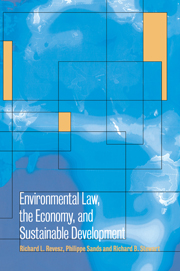 Environmental Law, the Economy and Sustainable Development
Environmental Law, the Economy and Sustainable Development Book contents
- Frontmatter
- Contents
- List of contributors
- Introduction: environmental regulation in multi-jurisdictional regimes
- PART I ENVIRONMENTAL REGULATION IN FEDERAL SYSTEMS
- 1 Federalism and environmental regulation: an overview
- 2 Economic criteria for applying the subsidiarity principle in European environmental law
- 3 The political economy of pollution control in a federal system
- PART II ENVIRONMENTAL REGULATION AND INTERNATIONAL TRADE
- PART III CHOICE OF ENVIRONMENTAL POLICY INSTRUMENTS
- PART IV THE ENVIRONMENTAL STANDARD - SETTING PROCESS
- PART V INTERNATIONAL ENVIRONMENTAL LAW AND SUSTAINABLE DEVELOPMENT
- Index
3 - The political economy of pollution control in a federal system
Published online by Cambridge University Press: 03 May 2010
- Frontmatter
- Contents
- List of contributors
- Introduction: environmental regulation in multi-jurisdictional regimes
- PART I ENVIRONMENTAL REGULATION IN FEDERAL SYSTEMS
- 1 Federalism and environmental regulation: an overview
- 2 Economic criteria for applying the subsidiarity principle in European environmental law
- 3 The political economy of pollution control in a federal system
- PART II ENVIRONMENTAL REGULATION AND INTERNATIONAL TRADE
- PART III CHOICE OF ENVIRONMENTAL POLICY INSTRUMENTS
- PART IV THE ENVIRONMENTAL STANDARD - SETTING PROCESS
- PART V INTERNATIONAL ENVIRONMENTAL LAW AND SUSTAINABLE DEVELOPMENT
- Index
Summary
Introduction
Professor Revesz has shown that the problem that federalism poses for environmental regulation arises from the fact that pollution produces interjurisdictional externalities and not from jurisdictional competition. Without externalities, Revesz has shown that competition among jurisdictions is generally welfare enhancing and attempts of the central government to impose more stringent environmental standards will only induce the jurisdictions to react by competing on some other margin. When interjurisdictional externalities exist, however, states will typically have an incentive to push the costs of industrial activity off onto their neighbors by making suboptimal locational and abatement decisions, and this may justify federal regulations.
Secondly, Revesz shows that existing administrative and court practices under the Clean Air Act in the United States are inappropriate in inducing jurisdictions to internalize the costs of their polluting decisions. Indeed, he shows that, if anything, federal regulations have probably induced regulatory pathologies that have made interjurisdictional opportunism even worse than it had been. The result is that the pattern of environmental regulations is almost certainly quite perverse from a social welfare perspective. The pattern of court and agency decisions has increased the incentives for states and their industrial denizens to locate polluting plants at downwind borders and build excessively tall smokestacks, making inappropriate capital investment decisions and the like.
Thirdly, Revesz argues that the lessons of US environmental regulatory policies are a valuable source of cautionary tales for the European Community and for the international community more generally.
- Type
- Chapter
- Information
- Environmental Law, the Economy and Sustainable DevelopmentThe United States, the European Union and the International Community, pp. 96 - 104Publisher: Cambridge University PressPrint publication year: 2000
- 1
- Cited by
